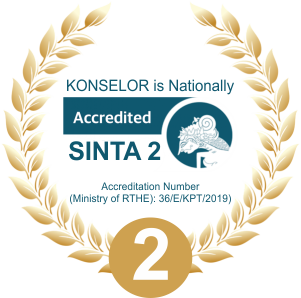Used betta fish multicolor as therapy for reducing addictive social media use in the covid-19 outbreak
 ), Rima Pratiwi Fadli(2), Yola Eka Putri(3), Dominikus David Biondi Situmorang(4), Ifdil Ifdil(5),
), Rima Pratiwi Fadli(2), Yola Eka Putri(3), Dominikus David Biondi Situmorang(4), Ifdil Ifdil(5), (1) Department of Guidance and Counseling, Faculty of Education, Universitas Negeri Padang
(2) Indonesian Institute for Counseling, Education, and Therapy, West Sumatera
(3) Indonesian Institute for Counseling, Education, and Therapy, West Sumatera
(4) Department of Guidance and Counseling Atma Jaya Catholic University of Indonesia Jakarta
(5) Department of Guidance and Counseling, Faculty of Education, Universitas Negeri Padang
 Corresponding Author
Corresponding Author
Copyright (c) 2023 Nilma Zola, Rima Pratiwi Fadli, Yola Eka Putri, Dominikusdavid.biondi76@gmail.com David Biondi Situmorang, Ifdil Ifdil
DOI : https://doi.org/10.24036/02021104122235-0-00
Full Text:
 Language :
Language :
Abstract
During the COVID-19 pandemic, people used social media to communicate and entertain themselves. Yet, excessive social media use can cause anxiety and sadness. Hence, fresh social media addiction therapies are crucial. We suggest treating social media addiction with colorful Betta fish. This fish's brilliant colors and interesting behavior reduce stress and anxiety and promote well-being. Betta fish are low-maintenance pets that may be kept in a small tank at home or at work. Interacting with animals helps improve mental health. So, the "betta fish" treatment may be a low-cost and accessible way to improve mental health and minimize social media addiction amid the COVID-19 pandemic. This intervention's efficacy and best practices need further stud.
References
Brailovskaia, J., & Margraf, J. (2020). Relationship between depression symptoms, physical activity, and addictive social media use. CYBERPSYCH BEH SOC N, 23(12), 818-822.
Chen, I. S. (2020). Turning home boredom during the outbreak of COVID-19 into thriving at home and career self-management: the role of online leisure crafting [Article]. International Journal of Contemporary Hospitality Management, 32(11), 3645-3663. https://doi.org/10.1108/ijchm-06-2020-0580
Ifdil, I., Fadli, R. P., Suranata, K., Zola, N., & Ardi, Z. (2020). Online mental health services in Indonesia during the COVID-19 outbreak [Letter]. Asian J Psychiatr, 51, 1-2, Article 102153. https://doi.org/10.1016/j.ajp.2020.102153
Lewis, M. (2017). Addiction and the brain: development, not disease. Neuroethics, 10(1), 7-18.
Paschke, K., Austermann, M. I., Simon-Kutscher, K., & Thomasius, R. (2021). Adolescent gaming and social media usage before and during the COVID-19 pandemic [Article]. Sucht, 67(1), 13-22. https://doi.org/10.1024/0939-5911/a000694
Shivley, J. M., Brookshire, W. C., & Baumgartner, W. A. (2021). Mixed Chromatophoroma (benign irido-melanocytoma) in a male Siamese fighting fish, Betta splendens, Regan [Article]. J FISH DIS, 44(3), 351-354. https://doi.org/10.1111/jfd.13303
Zhao, N., & Zhou, G. (2021). COVID-19 Stress and Addictive Social Media Use (SMU): Mediating Role of Active Use and Social Media Flow [Article]. Frontiers in Psychiatry, 12(1), 1-8, Article 635546. https://doi.org/10.3389/fpsyt.2021.635546
 Article Metrics
Article Metrics
 Abstract Views : 337 times
Abstract Views : 337 times
 PDF Downloaded : 82 times
PDF Downloaded : 82 times
Refbacks
- There are currently no refbacks.
Copyright (c) 2023 Nilma Zola, Rima Pratiwi Fadli, Yola Eka Putri, Dominikusdavid.biondi76@gmail.com David Biondi Situmorang, Ifdil Ifdil

This work is licensed under a Creative Commons Attribution 4.0 International License.







